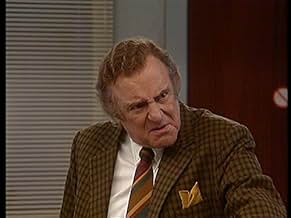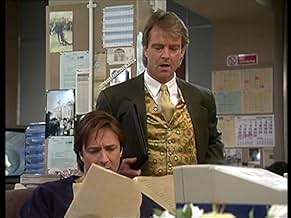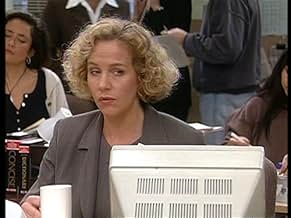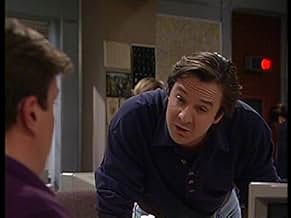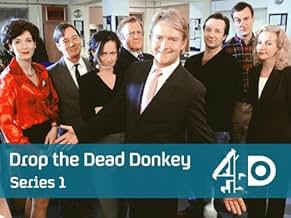Drop the Dead Donkey
- Série de TV
- 1990–1998
AVALIAÇÃO DA IMDb
8,0/10
1,8 mil
SUA AVALIAÇÃO
Adicionar um enredo no seu idiomaPolitical satire about television news company Globe Link and its team of workers such as anchors Henry and Sally, reporter Damien, editor Dave, execs George and Helen, assistant Joy and man... Ler tudoPolitical satire about television news company Globe Link and its team of workers such as anchors Henry and Sally, reporter Damien, editor Dave, execs George and Helen, assistant Joy and manager Gus Hedges.Political satire about television news company Globe Link and its team of workers such as anchors Henry and Sally, reporter Damien, editor Dave, execs George and Helen, assistant Joy and manager Gus Hedges.
- Ganhou 1 prêmio BAFTA
- 9 vitórias e 8 indicações no total
Explorar episódios
Avaliações em destaque
"Drop the Dead Donkey" ran in six series from 1990 to 1996. The bulk of the humour deals with then-topical British news, so the program doesn't really travel well, or last more than a week (a long time in politics). Best of all the episodes released on video was the award-winning "The Christmas Party", which had hardly any up-to-date content.
The central characters are all exaggerated caricatures of office and media stereotypes. Robert Duncan was good as jargon-spouting executive Gus Hedges, and Jeff Rawle as ineffectual editor George Dent. Haydn Gwynne played the cool, competent editor with a messy private life almost too well, so that the lighter Ingrid Lacey didn't have the same impact when she later filled the same role.
Stephen Tompkinson's acting was probably the best although he was mainly used for the slapstick scenes. (Listen for the inimitable voice of Andy Hamilton playing luckless cameraman Jerry, screaming "Damien!!!" as Tompkinson's suicidally reckless reporter leads them into imminent danger, in almost every episode.)
Susannah Doyle was a good "PA from Hell", but Sara Stewart's portrayal of a vapid blonde in the same slot in series 1 was also a delight.
David Swift's portrayal of a vain newsreader must have been uncomfortably close to some real life newsreaders, with his booming delivery, ruined liver, and his obvious "syrup of figs".
The series may have been killed off, but some of its highlights deserve to be remembered for a long time. Well done everybody, Andy Hamilton and Guy Jenkin in particular.
The central characters are all exaggerated caricatures of office and media stereotypes. Robert Duncan was good as jargon-spouting executive Gus Hedges, and Jeff Rawle as ineffectual editor George Dent. Haydn Gwynne played the cool, competent editor with a messy private life almost too well, so that the lighter Ingrid Lacey didn't have the same impact when she later filled the same role.
Stephen Tompkinson's acting was probably the best although he was mainly used for the slapstick scenes. (Listen for the inimitable voice of Andy Hamilton playing luckless cameraman Jerry, screaming "Damien!!!" as Tompkinson's suicidally reckless reporter leads them into imminent danger, in almost every episode.)
Susannah Doyle was a good "PA from Hell", but Sara Stewart's portrayal of a vapid blonde in the same slot in series 1 was also a delight.
David Swift's portrayal of a vain newsreader must have been uncomfortably close to some real life newsreaders, with his booming delivery, ruined liver, and his obvious "syrup of figs".
The series may have been killed off, but some of its highlights deserve to be remembered for a long time. Well done everybody, Andy Hamilton and Guy Jenkin in particular.
This was my favourite show back in the late 80's and early 90's. I still watch the occasional episode on the original channels' (UK Channel 4) online archive and end up watching 3 or 4 more.
Damien's tabloid/sensationalist "journalism", Henry Davenport, the grand old curmudgeon/geriatric ladykiller, Sally, the original faux-celeb, with her lapses into born again evangelical christianity and the pleasures of lorry driver cabs, Gus, well sometimes I would laugh the second when he walked on set, poor, put upon George the luckless hypochondriac and most of all, the psychotic office admin, Joy, who Id love to believe was the inspiration for Ruth in Ozark.
Give it a try if you can, especially the awards ceremony episode if you want to get off to a flyer.
Genius stuff.
As an Irish observer, this comedy has to be one of the high points of 1990's comedy.
While the main talking point of the series initially was it's topicality (being written and filmed in the week before filming so as to include observations and jokes about breaking news stories), later series were far less dependent on the topicality angle and more on funny honest and sharp character development.
It was immeasurably superior both to other office based comedy (viz the overrated IMHO "office") and to the likes of other newsroom comedies viz Murphy Brown. DTDD's humour was sharp acidic and right on the money. No-one was spared it's barbs.
On reruns and DVD releases a brief voice-over identifies the week each particular episode was shown and what the major stories breaking that week were.
More interestingly a lot of what was clearly the target of DTDD's humour (the dumbing down and tabloidisation of news reporting promoted by TV newstations) are even more in evidence today 10-15 years later as witnessed by the likes of FOX News and Sky News I wonder who Sir Royten Merchant was really based on....
While the main talking point of the series initially was it's topicality (being written and filmed in the week before filming so as to include observations and jokes about breaking news stories), later series were far less dependent on the topicality angle and more on funny honest and sharp character development.
It was immeasurably superior both to other office based comedy (viz the overrated IMHO "office") and to the likes of other newsroom comedies viz Murphy Brown. DTDD's humour was sharp acidic and right on the money. No-one was spared it's barbs.
On reruns and DVD releases a brief voice-over identifies the week each particular episode was shown and what the major stories breaking that week were.
More interestingly a lot of what was clearly the target of DTDD's humour (the dumbing down and tabloidisation of news reporting promoted by TV newstations) are even more in evidence today 10-15 years later as witnessed by the likes of FOX News and Sky News I wonder who Sir Royten Merchant was really based on....
Hilarious show, the humour still holds up and I should know I wasn't alive for any of the topical jokes
It is only dated because each episode tried very hard to include topical and amusing news items. All of the main characters are distinctive. George, the editor, is conscientious but seems totally out of place in the newsroom environment as he is a bit of a fragile eccentric. His boss Gus, a bit of a sad bachelor, is the king of Politically correct sound bites. Dave, who's job is a bit obscure, is the office 'stud' as well as being a chronic gambler. Henry, the aged newsreader, has clearly seen better days but is still convinced he is up to competing with Dave. The other newsreader, Sally, has a sex life which is mainly in Lorry parks and service stations. Joy,the officer gofer, is not a girl to be messed with and takes no prisoners. Damian, the young fearless reporter is totally obsessed with fame and has no regards for the feelings of others, particularly his on location staff. Helen, a lesbian, replaced Alex early on as Gerorges No 2. There is a bit of slapstick but the humour, which comes thick and fast, is mainly verbal.
Você sabia?
- CuriosidadesDuring the BBC documentary show, Comedy Connections (2003), screened in March 2006, the cast members confessed that most of their lines were actually written on the pieces of paper and clipboards that they were forever looking at during each episode. This was because scripts were written so close to transmission in order to keep it topical, that they often didn't have time to learn all their lines before shooting began.
- Citações
Gus Hedges: Could we interlock brain spaces in my work area?
- Cenas durante ou pós-créditosFor the first four series, the end credits invariably featured two characters discussing a recent news item in voiceover. This was changed to a more conventional final scene each week for the last two series due the pressure of filming so close to broadcast.
- ConexõesFeatured in Comedy Connections: Drop the Dead Donkey (2006)
Principais escolhas
Faça login para avaliar e ver a lista de recomendações personalizadas
- How many seasons does Drop the Dead Donkey have?Fornecido pela Alexa
Detalhes
Contribua para esta página
Sugerir uma alteração ou adicionar conteúdo ausente

Principal brecha
By what name was Drop the Dead Donkey (1990) officially released in India in English?
Responda
